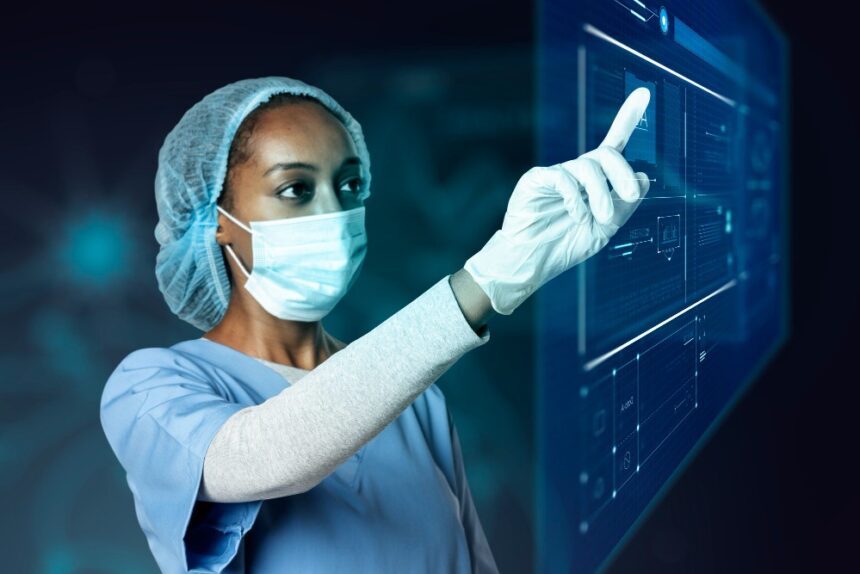The intersection of biotechnology and artificial intelligence (AI) has sparked a revolution in healthcare, promising to reshape the way diseases are diagnosed, treated, and prevented. These two powerful disciplines are converging to create innovative solutions that were once thought to be the realm of science fiction. In this blog post, we’ll delve deep into how biotechnology and AI are merging to redefine healthcare, exploring the benefits, challenges, and future potential of this dynamic collaboration.
What Is Biotechnology, and How Does It Interact with AI?
Biotechnology, at its core, involves using biological systems, organisms, or derivatives to develop solutions that improve human health. It spans areas like genetic engineering, molecular biology, and biopharmaceuticals.
Artificial intelligence, on the other hand, uses computational systems to mimic human cognitive functions. Machine learning (ML), a subset of AI, analyzes large datasets to identify patterns and make predictions, offering incredible potential for healthcare innovation.
When combined, biotechnology and AI can process vast amounts of biological data, leading to groundbreaking insights and practical applications in medicine.
Applications of Biotechnology and AI in Healthcare
1. Precision Medicine
Precision medicine is one of the most promising areas where biotechnology and AI converge. With advances in genomics, AI algorithms can analyze genetic data to determine an individual’s predisposition to specific diseases. This allows for highly personalized treatments tailored to the unique genetic makeup of each patient.
For instance, AI-driven tools like IBM Watson Health are capable of sifting through massive datasets to recommend customized treatment plans for cancer patients, improving survival rates and quality of life.
2. Drug Discovery and Development
Traditional drug discovery is a lengthy and expensive process. AI has revolutionized this field by rapidly identifying potential drug candidates and predicting their efficacy. Biotechnology companies use AI to simulate drug interactions at a molecular level, accelerating the development timeline.
One notable example is DeepMind’s AlphaFold, which uses AI to predict protein structures with remarkable accuracy. This breakthrough aids in understanding diseases at a molecular level, paving the way for innovative therapies.
3. Early Disease Detection
AI-powered diagnostic tools have shown tremendous promise in identifying diseases at their earliest stages. Biotechnology provides the data—genomic, proteomic, and metabolomic information—that AI analyzes to detect abnormalities.
For example, Google’s DeepMind has developed algorithms capable of identifying early signs of diabetic retinopathy in retinal scans, often before symptoms manifest. Similarly, AI models trained on genomic data can predict the likelihood of conditions like Alzheimer’s, enabling proactive interventions.
4. Advancements in Gene Editing
Gene editing tools like CRISPR have transformed the biotechnology landscape. When paired with AI, these tools become even more precise. AI helps researchers predict off-target effects and refine editing strategies, reducing errors in gene editing experiments.
This collaboration could lead to the effective treatment of genetic disorders like cystic fibrosis, sickle cell anemia, and even certain cancers.
5. Automation in Healthcare Workflows
AI-driven automation, supported by biotech innovations, is streamlining workflows in hospitals and laboratories. From robotic surgery to automated sample analysis, the fusion of these fields is improving efficiency and reducing human error.
For instance, AI-powered robotic systems assist in surgeries by providing enhanced precision, reducing recovery times, and improving patient outcomes.
The Role of Big Data in Merging Biotechnology and AI
Biotechnology generates massive amounts of data, from genomic sequences to patient health records. AI thrives on this data, using it to train algorithms for predictive modeling, pattern recognition, and decision-making.
Key technologies enabling this synergy include:
Cloud Computing: For storing and analyzing vast datasets.
Wearable devices: providing real-time health data.
Natural Language Processing (NLP): Extracting actionable insights from unstructured medical text.
Challenges in Integrating Biotechnology and AI
While the potential is immense, several challenges hinder the seamless integration of biotechnology and AI:
Data Privacy and Security: Handling sensitive patient data raises ethical and regulatory concerns.
Interdisciplinary Collaboration: Bridging the gap between biologists, data scientists, and healthcare professionals requires effective communication and training.
Algorithm Bias: AI models can inadvertently perpetuate biases present in training datasets, leading to unequal healthcare outcomes.
Regulatory Hurdles: Approvals for AI-driven biotech solutions are often slow due to the lack of standardized evaluation frameworks.
Addressing these challenges will be crucial for realizing the full potential of this transformative collaboration.
Future Prospects: What lies ahead?
The fusion of biotechnology and AI is just beginning. Here’s what the future could hold:
Digital Twins: virtual replicas of patients that simulate disease progression and treatment responses.
AI-Enhanced Vaccines: Using AI to design vaccines faster and more effectively, as demonstrated during the COVID-19 pandemic.
Synthetic Biology: AI can assist in designing synthetic organisms for use in biomanufacturing and environmental sustainability.
Global Health Equity: AI-powered biotech solutions could democratize access to cutting-edge medical care in underserved regions.
The integration of biotechnology and artificial intelligence is revolutionizing healthcare, offering solutions that were unimaginable just a few decades ago. From personalized medicine to AI-driven diagnostics, this partnership is pushing the boundaries of what is possible in medicine.
However, to fully harness its potential, stakeholders must navigate challenges around data privacy, regulatory approvals, and interdisciplinary collaboration. With continued innovation and responsible implementation, the combination of biotechnology and AI could usher in a new era of health and wellness for all.

